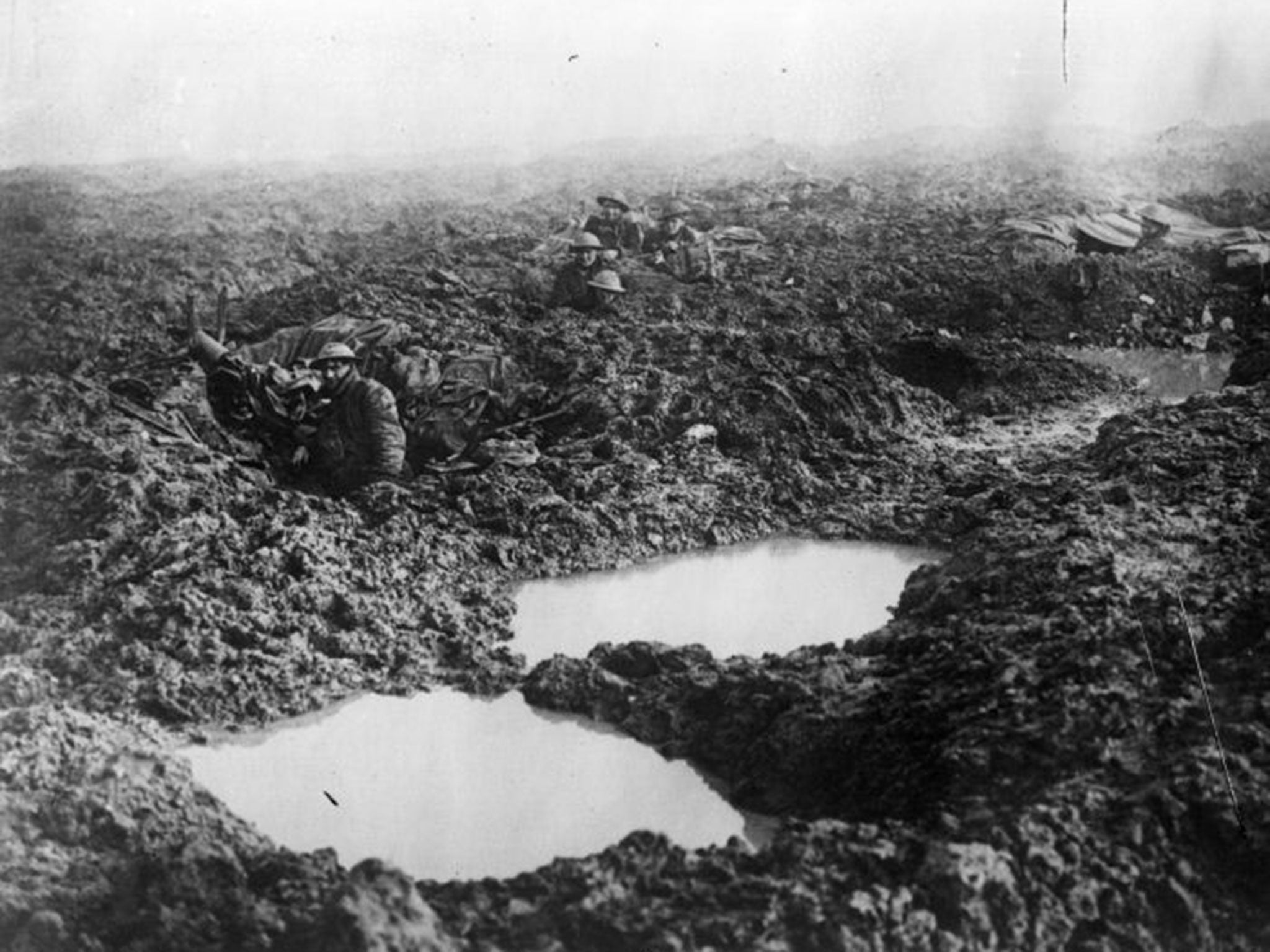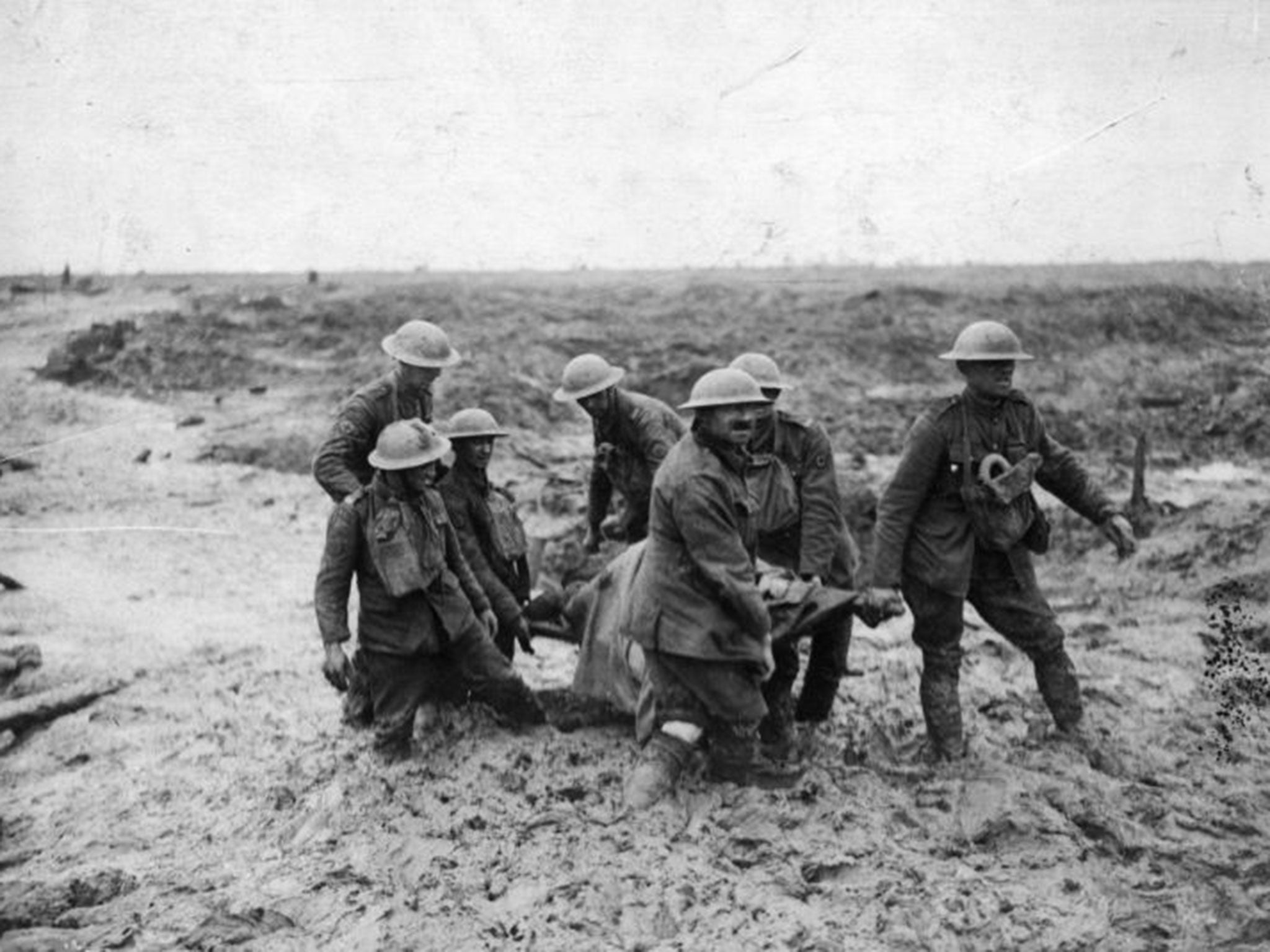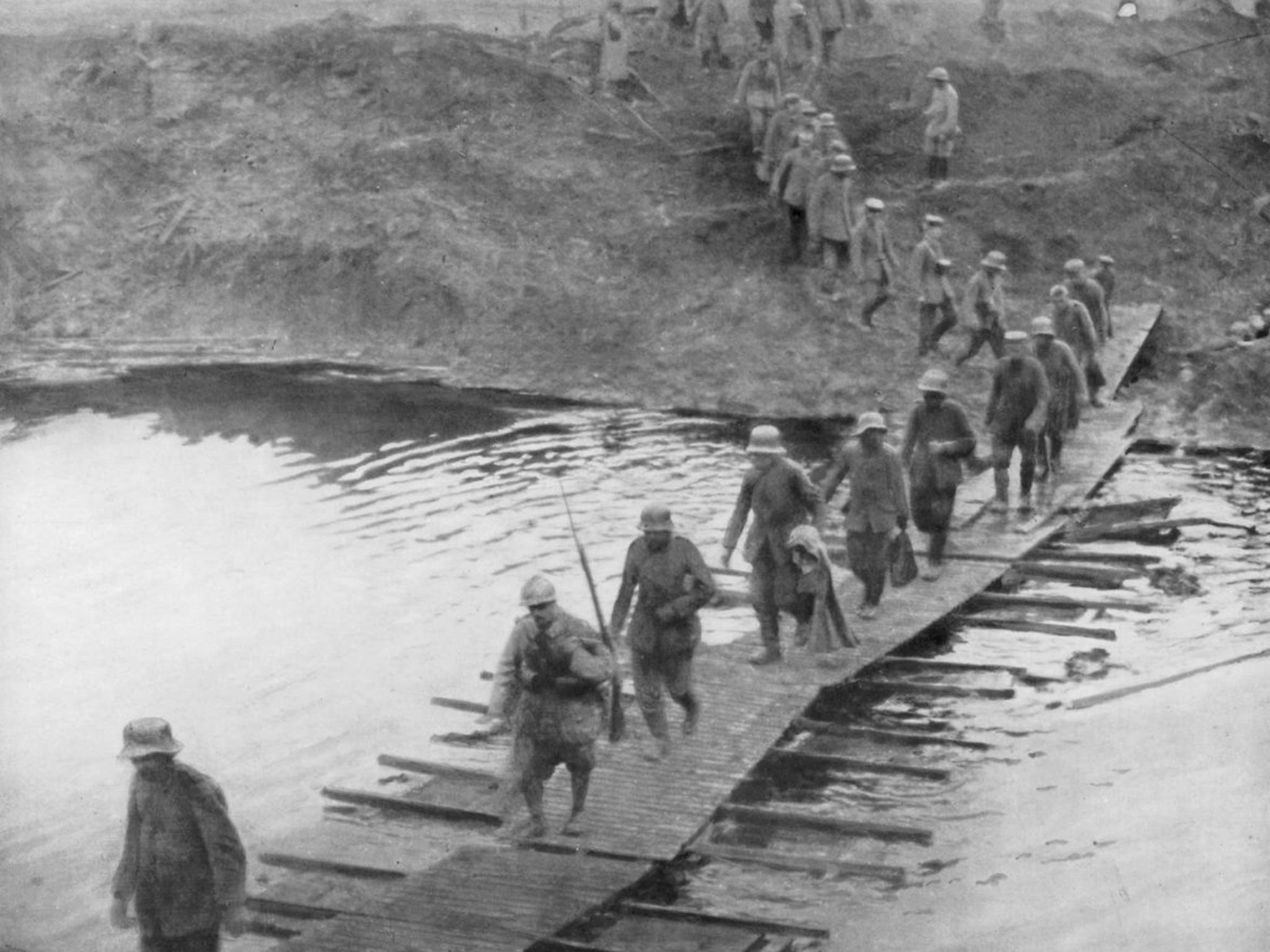A History of the First World War in 100 Moments: ‘From the darkness on all sides came the groans and wails of the wounded...’ - the battle for Langemarck Ridge
In the waterlogged killing fields around Passchendaele, the mud was as lethal as the guns. Edwin Campion Vaughan describes the ordeal of a single day

Your support helps us to tell the story
This election is still a dead heat, according to most polls. In a fight with such wafer-thin margins, we need reporters on the ground talking to the people Trump and Harris are courting. Your support allows us to keep sending journalists to the story.
The Independent is trusted by 27 million Americans from across the entire political spectrum every month. Unlike many other quality news outlets, we choose not to lock you out of our reporting and analysis with paywalls. But quality journalism must still be paid for.
Help us keep bring these critical stories to light. Your support makes all the difference.
While we were talking a message arrived from Brigade: “There is a nice drying wind. The attack will take place. Render any final indents for materials forthwith.”
Pepper read this out to me in a tone which implied “This is the end of us!” Then he scribbled a few words on a message pad and tossed it across saying: “Shall I send that?” He had indented for “96 pairs of Waterwings. Mark III’’. I laughed and bade him “cheerio”. As I went out, I met the CO moving up to his HQ. I said: “It doesn’t look very promising for the attack, Sir.” “No,” he said, seriously, “but it’s too late to put it off now.”
… The hours crept on; our barrage had lifted from the German line and now was falling on Langemarck Ridge. At last, when sick with the uncertainty and apprehension the CO, Mortimore, Coleridge and I were huddled in the tiny cubicle of HQ, a runner arrived with a report from Taylor that the attack was completely held up: “casualties very heavy”.
It was then 6.30pm. With grey face the CO turned to me saying “Go to the gunpits, Vaughan, and see if you can do anything. Take your instructions from Taylor.” As I saluted, backing out of the low doorway, he added forlornly: “Good luck.” I called up my HQ staff and told them that we were making for the gunpits, warning them to creep and dodge the whole way. Then I ran across the road and dived into the welter of mud and water, followed by Dunham and – at intervals – by the eight signallers and runners.
Immediately there came the crackle of bullets and mud was spattered about me as I ran, crawled and dived into shell-holes, over bodies, sometimes up to the armpits in water, sometimes crawling on my face along a ridge of slimy mud around some crater… As I neared the gunpits I saw a head rise above a shell-hole, a mouth opened to call something to me, but the tin hat was sent flying and the face fell forward into the mud…
I had almost reached the gunpits when I saw Wood looking at me, and actually laughing at my grotesque capers. Exhausted by my efforts, I paused a moment in a shell-hole; in a few seconds I felt myself sinking, and struggle as I might I was sucked down until I was firmly gripped round the waist and still being dragged in. The leg of a corpse was sticking out of the side, and frantically I grabbed it; it wrenched off and casting it down I pulled in a couple of rifles and yelled to the troops in the gunpit to throw me more. Laying them flat I wriggled over them and dropped, half dead, into the wrecked gun position.

Here I reported to Taylor and was filled with admiration at the calm way in which he stood, eyeglass firmly fixed in his ashen face, while bullets chipped splinters from the beam beside his head. He told me that the attack had not even reached the enemy front line, and that it was impossible to advance across the mud. Then he ordered me to take my company up the hard road to the Triangle and to attack Springfield. He gave his instructions in such a matter-of-fact way that I did not feel alarmed, but commenced forthwith to collect “C” Company men from the neighbouring shell-holes…
So many of our men had been killed, and the rest had gone to ground so well, that Wood and I could only collect a very few… Finally, Wood and I led 15 men over to the tanks. The fire was still heavy, but now, in the dusk and heavy rain, the shots were going wide. As we reached the tanks, however, the Boche hailed shrapnel upon us and we commenced rapidly to have casualties… Up the road we staggered, shells bursting around us. A man stopped dead in front of me, and exasperated I cursed him and butted him with my knee. Very gently he said, “I’m blind, sir,” and turned to show me his eyes and nose torn away by a piece of shell.
“Oh God! I’m sorry, sonny,” I said. “Keep going on the hard part,” and left him staggering back in his darkness. At the Triangle the shelling was lighter and the rifle fire far above our heads. Around us were numerous dead, and in shell-holes where they had crawled to safety were wounded men. Many others, too weak to move, were lying where they had fallen and they cheered us faintly as we passed: “Go on boys! Give ‘em hell!”…
A tank had churned its way slowly round behind Springfield and opened fire; a moment later I looked and nothing remained of it but a crumpled heap of iron; it had been hit by a large shell. It was now almost dark and there was no firing from the enemy; ploughing across the final stretch of mud, I saw grenades bursting around the pillbox and a party of British rushed in from the other side. As we all closed in, the Boche garrison ran out with their hands up; in the confused party I recognised Reynolds of the 7th Battalion, who had been working forward all the afternoon. We sent the 16 prisoners back across the open but they had only gone 100 yards when a German machine-gun mowed them down.

Reynolds and I held a rapid conference and decided that the cemetery and Spot Farm were far too strongly held for us to attack, especially as it was then quite dark; so we formed a line with my party on the left in touch with the Worcesters, who had advanced some 300 yards further than we, and Reynolds formed a flank guard back to the line where our attack had broken. I entered Springfield, which was to be my HQ. It was a strongly built pillbox, almost undamaged; the three defence walls were about 10ft thick, each with a machine-gun position, while the fourth wall, which faced our new line, had one small doorway – about 3ft square. Crawling through this I found the interior in a horrible condition; water in which floated indescribable filth reached our knees; two dead Boche sprawled face downwards and another lay across a wire bed. Everywhere was dirt and rubbish and the stench was nauseating.
On one of the machine-gun niches lay an unconscious German officer, wearing two black-and-white medal ribbons; his left leg was torn away, the bone shattered and only a few shreds of flesh and muscle held it on. A tourniquet had been applied, but had slipped and the blood was pouring out. I commenced at once to re-adjust this and had just stopped the bleeding when he came round and gazed in bewilderment at my British uniform. He tried to struggle up, but was unable to do so and, reassuring him, I made him comfortable, arranging a pillow out of a Boche pack. He asked me faintly what had happened, and in troops’ German I told him “Drei caput – others Kamerad,” at which he dropped back his head with a pitiful air of resignation. I offered him my water-bottle, but when he smelled the rum he would not touch it, nor would he take whisky from my flask, but when one of my troops gave him water he gulped it greedily…
All was quiet around us now, but the Germans were still shelling the St Julien road. Suddenly I heard a commotion at the doorway and two fellows crawled in dragging a stretcher which they hoisted on to the wire bed in front of me. It was an officer of the 8th Worcester who greeted me cheerily.
“Where are you hit?” I asked.
“In the back near the spine. Could you shift my gas helmet from under me?”
I cut away the satchel and dragged it out; then he asked for a cigarette. Dunham produced one and he put it between his lips; I struck a match and held it across, but the cigarette had fallen on his chest and he was dead.
I picked up a German automatic from the bed and, in examining it, loosed off a shot which hit the concrete near the Boche’s head; he gave a great start and turned towards me, smiling faintly when he saw that it was accidental. Then he commenced to struggle to reach his tunic pocket; I felt in it for him and produced three pieces of sugar. Taking them in his trembling hand, he let one fall into the water, gazing regretfully after it; another he handed to me. It was crumbling and saturated with blood so I slipped it into my pocket whilst pretending to eat it. I now produced some bread and meat; he would not have any, but I ate heartily sitting on the wire bed with my feet in the water and my hands covered in mud and blood…
Now with a shrieking and crashing, shells began to descend upon us from our own guns, while simultaneously German guns began to shell their own lines. In my haversack all this time I had been carrying a treasure which I now produced – a box of 100 Abdulla Egyptians.
I had just opened the box when there was a rattle of rifles outside and a voice yelled, “Germans coming over, sir!” Cigarettes went flying into the water as I hurled myself through the doorway and ran forward into the darkness where my men were firing. I almost ran into a group of Germans and at once shouted, “Ceasefire!” for they were unarmed and were “doing Kamerad”.
The poor devils were terrified; suspicious of a ruse, I stared into the darkness while I motioned them back against the wall with my revolver. They thought I was going to shoot them and one little fellow fell on his knees babbling about his wife and “zwei Kinder”.
Going forward I found that several of the party were dead, and another died as I dragged him in. The prisoners clustered round me, bedraggled and heart-broken, telling me of the terrible time they had been having, “Nichts essen,” “Nichts trinken,” always shells, shells, shells! They said that all of their company would willingly come over. I could not spare a man to take them back, so I put them into shell-holes with my men who made great fuss of them, sharing their scanty rations with them.
Re-entering the pillbox I found the Boche officer quite talkative. He told me how he had kept his garrison fighting on, and would never have allowed them to surrender. He had seen us advancing and was getting his guns on to us when a shell from the tank behind had come through the doorway, killed two men and blown his leg off.
His voice trailed away and he relapsed into a stupor. So I went out again into the open and walked along our line; a few heavies were still pounding about us, but a more terrible sound now reached my ears.
From the darkness on all sides came the groans and wails of wounded men; faint, long, sobbing moans of agony, and despairing shrieks. It was too horribly obvious that dozens of men with serious wounds must have crawled for safety into new shell-holes, and now the water was rising about them and, powerless to move, they were slowly drowning. Horrible visions came to me with those cries – of Woods and Kent, Edge and Taylor, lying maimed out there trusting that their pals would find them, and now dying terribly, alone among the dead in the inky darkness. And we could do nothing to help them; Dunham was crying quietly beside me, and all the men were affected by the piteous cries.
Edwin Stephen Campion Vaughan MC (1897-1931) was a subaltern in the Royal Warwickshire Regiment. His diary of his experiences on the Western Front was published as “Some Desperate Glory” in 1981 (Frederick Warne); republished in 2011 with a foreword by John Terraine (Pen & Sword). Vaughan was awarded the Military Cross in 1918.
Tomorrow: The eagle hut opens in Aldwych
The '100 Moments' already published can be seen at: independent.co.uk/greatwar
Subscribe to Independent Premium to bookmark this article
Want to bookmark your favourite articles and stories to read or reference later? Start your Independent Premium subscription today.
Join our commenting forum
Join thought-provoking conversations, follow other Independent readers and see their replies
Comments